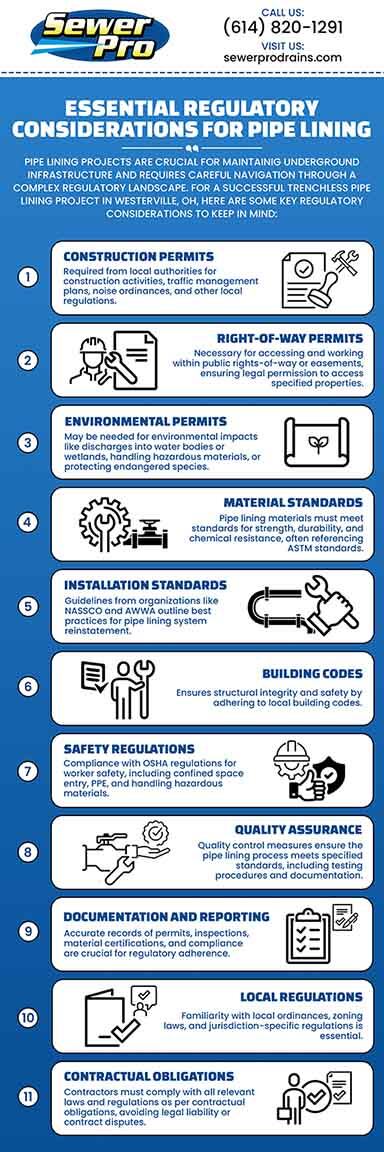Regulatory Considerations for Pipe Lining Projects

Pipe lining projects, critical for maintaining underground infrastructure, are governed by a stringent regulatory landscape. Contractors like Sewer Pro must navigate permits, standards, and compliance requirements to ensure projects involving trenchless pipe lining in Westerville, OH meet legal and safety standards while delivering effective solutions. This discussion explores the key regulatory considerations essential for successful project execution in this specialized field.

Permits
Construction Permits: These may include permits from local authorities or municipalities allowing for construction activities, traffic management plans, noise ordinances, and other local regulations.
Right-of-Way Permits: Often required for accessing and working within public rights-of-way or easements. These permits ensure that the contractor has legal permission to access and work on the specified property.
Environmental Permits: Depending on the location and scope of the project, pipe lining companies may need permits related to environmental impacts such as discharges into water bodies or wetlands, handling of hazardous materials, or protection of endangered species.
Standards and Codes
Material Standards: Pipe lining materials, such as the ones used in cast iron pipe lining, must meet specific standards for strength, durability, and chemical resistance. Standards such as the American Society for Testing and Materials (ASTM) are commonly referenced in the industry.
Installation Standards: Guidelines and best practices for reinstating pipe line systems are outlined by organizations like the National Association of Sewer Service Companies (NASSCO) and the American Water Works Association (AWWA).
Building Codes: Adherence to local building codes ensures that the structural integrity and safety of the process meet regulatory requirements.
Compliance Requirements
Safety Regulations: Contractors must comply with Occupational Safety and Health Administration (OSHA) regulations regarding worker safety, including confined space entry, personal protective equipment (PPE), and handling of hazardous materials.
Quality Assurance: Quality control measures are essential to ensure the sewer pipe lining process meets specified standards and project requirements. This includes testing procedures and documentation of results.
Documentation and Reporting: Keeping accurate records of permits, inspections, material certifications, and compliance with regulatory requirements is crucial for demonstrating adherence to regulations.
Additional Considerations
Local Regulations: Regulatory requirements can vary significantly by location, so CIPP pipe lining contractors must be familiar with and adhere to local ordinances, zoning laws, and other jurisdiction-specific regulations.
Contractual Obligations: Contractors often have contractual obligations to clients that include compliance with all relevant laws and regulations. Failure to comply could result in legal liability or contract disputes.
Navigating the regulatory landscape for pipe lining projects requires thorough understanding and compliance with permits, standards, and various regulatory requirements. Sewer Pro stays informed about evolving regulations and ensures that our projects meet all necessary legal and safety standards to achieve successful outcomes. Contact us today to schedule an appointment.
Schedule An Appointment
Sewer Pro is a company backed by an experienced team that routinely meets and exceeds the expectations of residential, commercial, and municipal clients. You'll find that our rates are reasonable and our staff is friendly and knowledgeable. Call us today or fill out our form to schedule an appointment.



